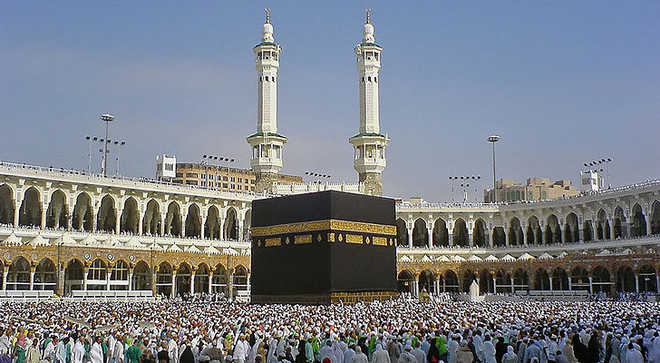Hajj: Why Nigeria must get it right now
By Allah’s divine providence, I would be among the millions Muslims that are planning to perform this year’s hajj. The last time I performed hajj was about 12 years ago and the experience wasn’t palatable. Having completed the payment of the hajj fares, I took it upon myself to be abreast with anything hajj particularly […]


By Allah’s divine providence, I would be among the millions Muslims that are planning to perform this year’s hajj. The last time I performed hajj was about 12 years ago and the experience wasn’t palatable.
Having completed the payment of the hajj fares, I took it upon myself to be abreast with anything hajj particularly this year: I want to know the level of preparedness by the hajj regulatory agency, the National Hajj Commission of Nigeria (NAHCON), in visa processing, hajj transit camps, airlift of pilgrims to Saudi Arabia and back, the transport system in Saudi Arabia, the feeding, animal sacrifice, health care system, accommodation in Makkah, Mina and Madinah, safety of pilgrims, among others.
My last experience was anything but comfortable. First, I spent three days at the airport before I was airlifted to the holy land; on my way back, I spent five days in Jeddah airport. This didn’t include the terrible and mosquito-infested-four nights I spent at the hajj camp in Nigeria.
Yes, it is a holy ritual that every Muslim aspires to perform. But by the time I returned, I was ill for two weeks.
This explains why I developed interest on the “innovations” if any put in place by the hajj authorities as the airlift begins August 8, 2016. I equally studied how other Muslim countries such as Indonesia, Pakistan, India and Malaysia, among others are conducting their activities with less hassle.
One of the issues that bothered me was the safety of the pilgrims in the holy land, particularly with last year’s twin tragedies of Haram crane crash and the Mina crush that claimed the lives of many pilgrims.
I waited to see what the hajj authorities in Nigeria will put in place as safety measures this year, having lost over 200 pilgrims in the Mina crush and about 40 others still “missing and unidentified.”
Part of the problems of the hajj when I travelled 12 years ago was the “manual and unscientific” ways of handling issues by the hajj officials.
Then suddenly, I stumbled on that piece of news that NAHCON is introducing electronic tracker for all pilgrims performing this year’s hajj. The explanation by the NAHCON’s director of Information and Communication Technology (ICT), Dr. Ashiru Sani Daura, on how the new device will detect the whereabouts of individual pilgrims using the GPS technology, is impressive.
The ICT director said the commission opted for the new technology on the advice of the presidency which, last year, wrote suggesting that it should emulate Algeria which was doing similar thing for its pilgrims.
But nothing goes without controversy in Nigeria as the cyberspace was loaded with stories that Saudi authorities plan to give wrist bands to pilgrims this year.
The official, however, explained that contrary to the claims that Saudi authorities were already coming up with the wrist band, the one by NAHCON was more advanced and that it “can detect persons from the computer screen while the one to be issued by the Saudi government only uses a barcode reader.”
He said contrary to insinuations that the wristband tracker cost N25,000, contract documents seen by Blueprint showed that each pilgrim is charged N8,400 for it. “The wristband will also be useful to pilgrims in distress who can place a call just by pressing it and we can get the signal immediately and mobilise our men,” he said.
The Guardian also reported NAHCON’s head of aviation, Mohammadu Goni, explaining that three indigenous airlines – Dornier Aviation Nigeria AEP Ltd; Top Brass and Azman Air Services – earlier approved by hajj authorities in Nigeria were disqualified by Saudi authorities.
Goni said the General Authority of Civil Aviation of Saudi Arabia (GACA) cleared only three airlines- Med-View Airlines Ltd.; Max Air Ltd. and Fly-Nas Air (Saudi Arabian designated carrier)- of the six nominated by the federal government.
He said NAHCON had made concerted efforts to ensure that the Saudi Arabian Government allowed the three disqualified airlines to participate in the exercise, but to no avail.
He said that it was clearly stipulated in GACA that any country participating in the Hajj must give 50 per cent of its total pilgrims to Saudi airlines to transport them.
The contentious issue of miqat, which was dominant 12 years ago, seemed to have been settled now as NAHCON plans to airlift over 95 percent of the 70,000 Nigerian pilgrims directly to Medina.
In 2105, about 90 percent of Nigerian pilgrims were airlifted to Madinah airport directly, thereby relieving pilgrims the stress of going by road and reducing the excessive arguments by clerics on the appropriateness or otherwise of using Jeddah airport as miqat.
The visa request has since gone online through the E-tracking online hajj integrated system introduced by Saudi Arabia.
The refund of the N1.7 billion to pilgrims from year’s hajj by NAHCON for services not rendered was a great sign of change in hajj administration.
On accommodation, NAHCON has secured hotels at the door steps of Haram mosque in Madina for Nigerian pilgrims.
An Islamic bank, Jaiz Bank Plc, has been appointed as official fee collection agent for Hadaya (animal sacrifice) for this year’s hajj. The need to go Mina animal market or dealing with suspicious pilgrims officials over my hadaya has been dealt with.
May God makes this year’s hajj a safer, better and hassle-free one for Nigerian pilgrims, and Mulsims in general.
Al-Siddeeq, an educationist, wrote from Oshogbo, Osun State
